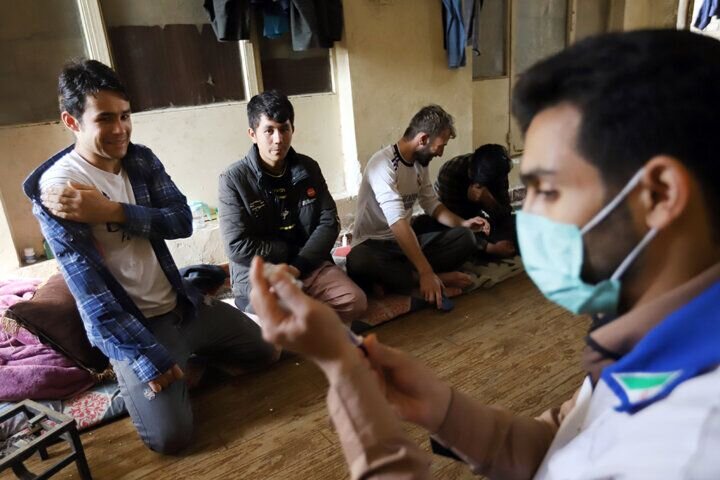IRCS, ICRC join hands to support Afghan refugees

TEHRAN –The Iranian Red Crescent Society (IRCS) and the International Committee for Red Cross (ICRC) in Iran are conducting joint programs to address the challenges facing Afghan refugees and vulnerable Iranians residing in Golshahr district in Mashhad, northeastern Khorasan Razavi province.
"The initiative to provide primary health and rehabilitation services to Afghan immigrants and residents of Golshahr district is part of the joint program," IRNA quoted Razieh Alishvandi, the IRCS director for international affairs, as saying.
Based on the memorandum of understanding (MOU) that was signed in the Iranian calendar year 1392 (2013 –2014), IRCS and ICRC agreed to support the rehabilitated refugees.
The program aims to provide basic health, mental health, educational, and social services. It also focuses on providing preventive and social assistance and reducing social harm to the target population, she added.
Physically disabled people will benefit from rehabilitation services and mobility aids including orthotics and prostheses, wheelchairs, walkers, and sticks, Alishvandi noted.
They will also enjoy relevant physical therapy services such as physiotherapy or occupational therapy based on the committee's definitions.
The service recipients will be identified by the Society for Recovery and Support to be approved by the representative of the ICRC and then referred to the IRCS to receive these services.
The project is being implemented in four provinces on the eastern border of the country after the arrival of Afghan immigrants who left their countries because of the new governance in Afghanistan.
Funded by ICRC, the necessary preparations have been made to equip the IRCS rehabilitation centers in Mashhad which offer services to a large number of residents and Afghan nationals.
Mine awareness project
The project aims to raise public awareness of the dangers of mines and unexploded ordnance left over from the war, especially in six provinces namely Kordestan, Kermanshah, Ilam, West Azarbaijan, Khuzestan, and Khorasan-Razavi, Alishvandi said.
The project also includes increasing foreign nationals' awareness of landmine dangers while returning to their home country through shared borders.
International humanitarian law project
Considering the mission of the ICRC in educating and promoting international humanitarian law during peacetime, the committee has had extensive collaborations with the IRCS and the secretariat of the National Humanitarian Rights Committee which are ongoing, the official mentioned.
A total of 30 provincial educational workshops have been held to familiarize the IRCS staff with the structure of the international movement and humanitarian rights. The workshops are scheduled to continue in the future.
IRCS and ICRC have also cooperated in holding numerous conferences on international humanitarian law, like an international congress on the occupation of Palestine.
Moreover, the ICRC and the IRCS hold coordination meetings to boost their contribution to the regional and international conferences and promote international humanitarian law, the same as cooperating for the 34th international conference of the International Federation of Red Cross and Red Crescent Society (IFRC), which will be held in Geneva in October this year.
Health services to vulnerable immigrants
In December 2023, Alishvandi, and Vincent Cassard, the head of the ICRC delegation in Iran, paid a visit to the Golshahr project site, the IRCS website reported.
The project focused on the provision of health services to pregnant women, and people who are suffering from diabetes, high blood pressure, asthma, mental health disorders, and physical disorders, Alishvandi said.
“The Society for Recovery and Support provides an opportunity for Afghan women who need psychological support to share and solve their problems.”
Launching home businesses and vocational training centers, empowering for creating jobs, earning money, educating, and raising children were among the other programs of the IRCS in this regard.
It is worth noting that the IRCS health project is carried out by physicians, nurses, social workers, and dieticians. The health project includes medical consultations, physical rehabilitation, referrals to laboratories and radiology centers, dental centers, and specialists.
It also provides support for purchasing medication, receiving psychological and psychiatric consultations, nutrition, and holding health awareness-raising sessions with the help of nurses and dieticians.
MT/MG
